
Image Credit: Ross Halfin (All photos courtesy of Tommy Thayer).
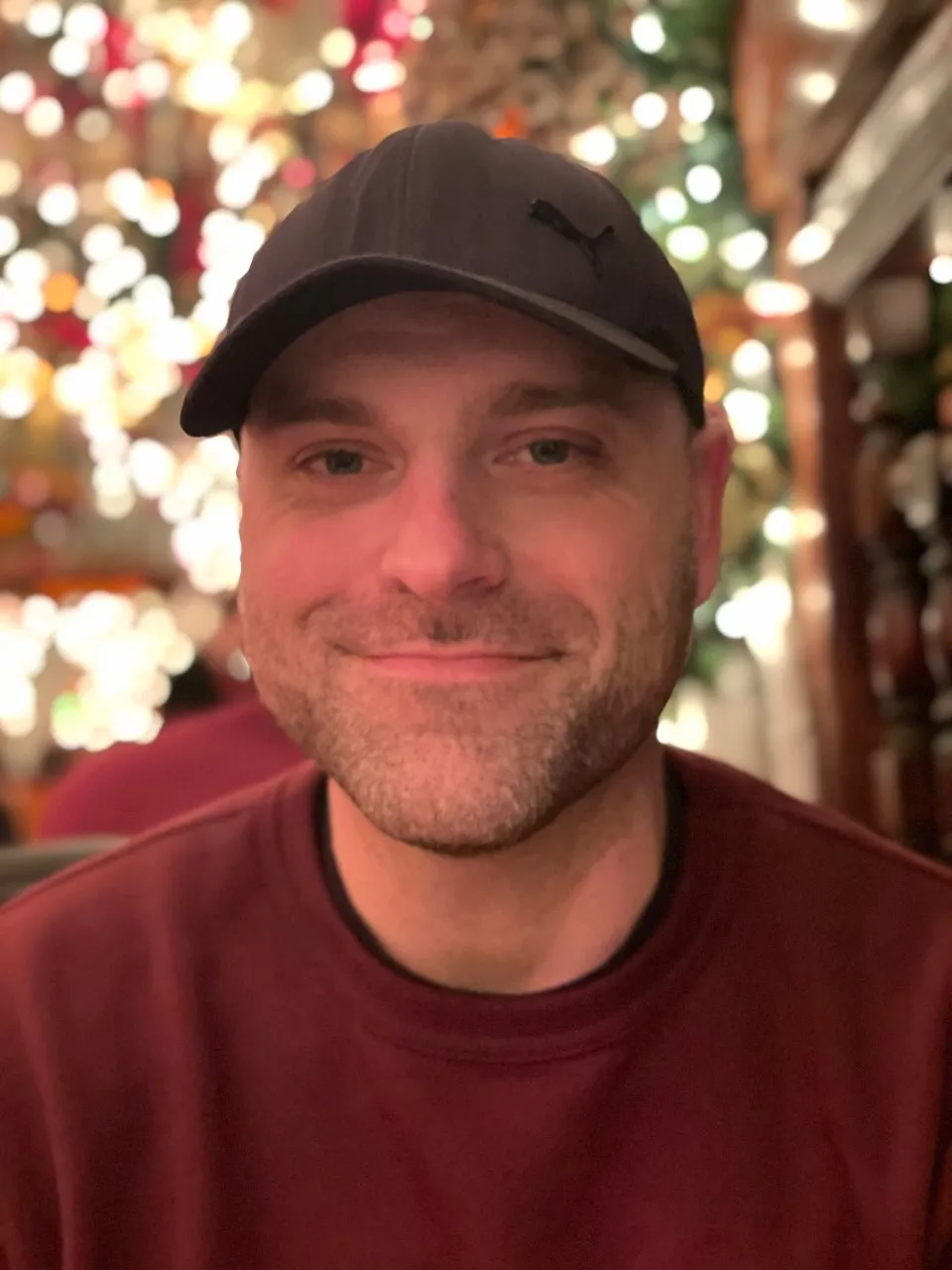
By Andrew Daly
[email protected]

For veteran rockers, life on the road can be long and hard, and while COVID-19 has presented its own set of challenges, the silver lining is that for some, it’s been time to rest and reflect. For KISS guitarist Tommy Thayer, it’s been a time to slow down and look back on 35-plus years in music.
From his early days in garage bands to signing his first record deal, to making his mark in the 80s with Black N’ Blue, and finally settling in with KISS, you could say it’s been one hell of a ride for Tommy Thayer, and he’s not even close to done yet.
It’s a pleasure to have Tommy Thayer with us today. We talk about his origins in music, what inspired him growing up, his days with Black N’ Blue, his time in KISS, potential new music, and the real scoop on KISS’ 1998 “reunion” album, Psycho Circus.
If you would like to learn more about Tommy, head over to his website, or follow him on Instagram, Twitter, and Facebook. Once you’ve done that, dig into this interview with one of the hardest rockin’ guitarists out there today, Tommy Thayer. Cheers.
Andrew:
Tommy, thank you for taking the time to speak with us. This last year has been rough, right? How are you holding up during this seemingly ever-raging dumpster fire?
Tommy:
Tough year for so many no doubt, but for me, it was just different. I tried to learn to slow down a bit, I had to, but also take the time to do things I normally wouldn’t do or have the time to do. On a personal level, something amazing happened last year, more on that later.
Andrew:
Tell us about your backstory. What was your musical gateway so to speak?
Tommy:
Me, my three brothers and my sister grew up in a musical environment at home. My mom Patricia was an artist, a painter, and also very musical. She had a beautiful singing voice, played piano, and played the violin. When we were kids, she painted colorful cartoon-type scenes on the walls of our bedrooms, the kind of stuff kids love. She played Classical music at home on the radio, along with all the Rogers and Hammerstein and Frederick Lowe Broadway musicals. I believe that environment had a musical impact on me growing up. She recognized and encouraged my ambitions to play first the saxophone in the school band and then also the guitar.
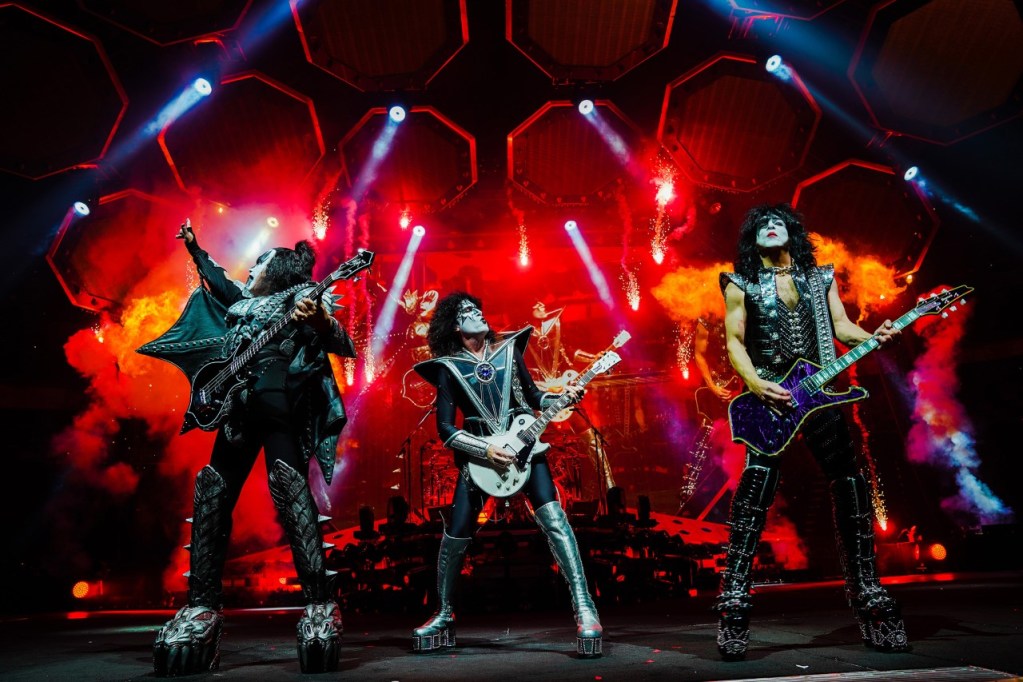
Andrew:
As an artist and guitarist, who are some of your earliest and most important influences? How did you develop your signature sound?
Tommy:
When I started playing guitar at 13, it was all around me at home. I was already buying records by Deep Purple, Black Sabbath, early KISS, Montrose, Aerosmith, Chicago, Creedence Clearwater Revival, Elton John, and Peter Frampton. My older brothers were playing The Beatles, The Byrds, CSN, The Who, Rolling Stones, and Neil Young.
Andrew:
Let’s talk about some current events. KISS is on The End of the Road Tour, which is unfortunately halted at the moment due to COVID. That said, the band just wrapped up an incredible show in Dubai, right? Tell us about the experience.
Tommy:
I didn’t know what to expect; none of us had ever been to Dubai or that part of the world. As it turned out, it was an amazing place, friendly people, very high-end, clean, beautiful resorts and beaches. The architecture and design of the city were over-the-top. I’d like to go back there for a vacation sometime. The lead up including LA rehearsals, the traveling and then being in Dubai for several days before the show was tedious because of the COVID protocols. We were tested every other day under strict quarantine for the entire month of December. In Dubai, our crew and all the local crews were tested every day. Seeing photos of the stage, it’s hard to get a sense of the scale and enormity of the production. It was by far the biggest KISS stage ever. It was also strange to spend that much time preparing for one show, all the startup, weeks of rehearsals, then doing it and suddenly it’s over.
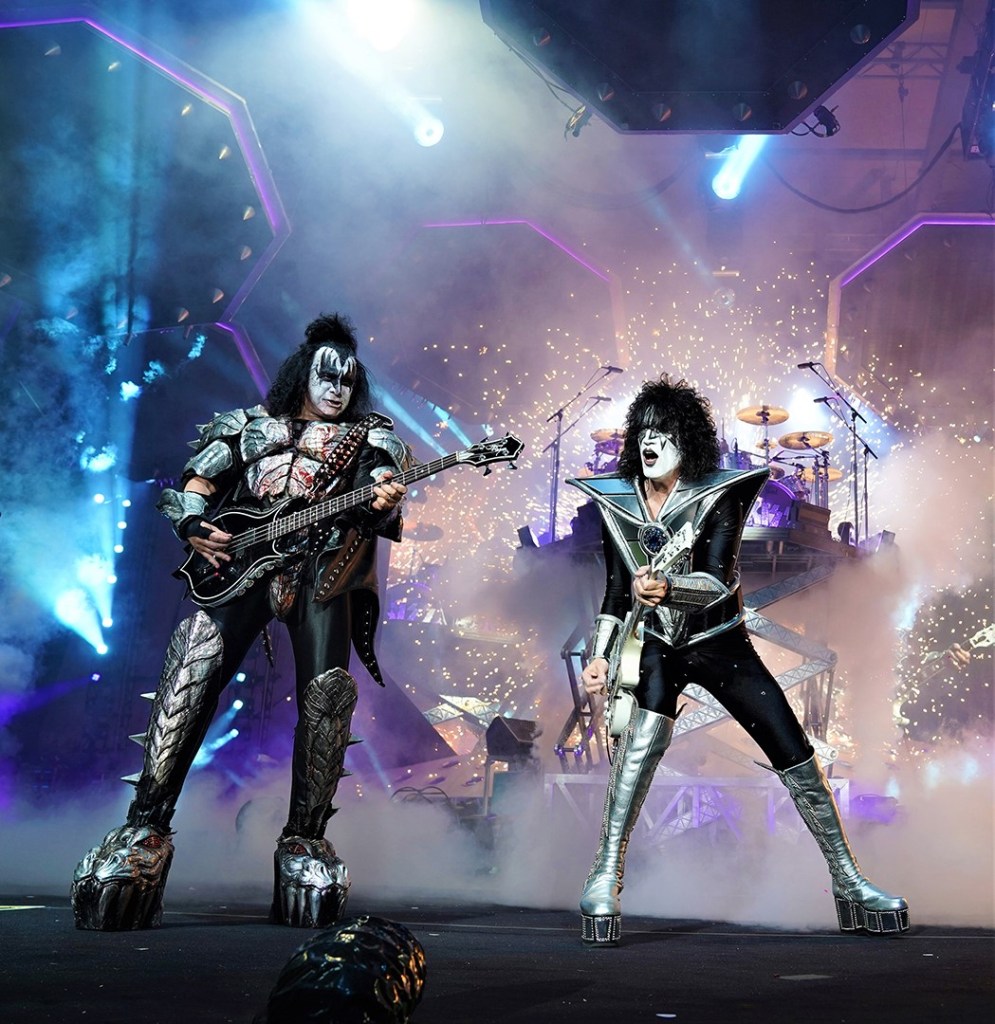
Andrew:
A bit more on The End of the Road Tour now. You’ve been an official member of KISS since 2002, right? Has it been sort of surreal watching this final tour play out? KISS has such a storied history, and so wrapping one’s head around the idea of no more tours is hard to do. Tell us your thoughts on the entire tour thus far. What has the experience been like?
Tommy:
The End of the Road Tour is about the legacy of KISS, pure and simple. It’s also about the fans and their connection to the band. It’s interesting how it’s become so generational. When I see young kids at the shows, and there’s a lot of them, I wonder how the hell did they got turned on to KISS? It’s interesting how so many long-time fans bring their kids and pass the torch. Gene and Paul have driven it for almost 50 years now and surprisingly still with the same amount of passion.
Andrew:
I mentioned before that you’ve been an official member of KISS since 2002, which actually makes you the longest-tenured lead guitarist in the band’s storied history. That said, your history with KISS specifically goes all the way back to the 80s, right? You were involved with Hot in the Shade, Revenge, and Carnival of Souls as a co-writer and you also contributed some backing vocals. Given your long-running history, it’s kind of seemed like you ending up in KISS was fated to happen, right?
Tommy:
I never set out to do this a certain way with a particular goal. It was more about following what I loved, in my case, it was a passion for Rock ‘N’ Roll music and bands. Over time, things fell into place. I definitely didn’t aspire to be a rock star. I just got involved. In the beginning, it was just jamming with friends in their parent’s living room or garage. At the time, I hadn’t learned to play guitar very well yet, so I just sang backup vocals. It was about getting involved, and it’s surprising over time what can happen. Lately, I’ve had so much extra time, I started going through all the stuff I’ve stored and collected through the years. I was struck by how much I had done and accomplished in 45 years of music. Garage bands, school dances, local clubs in Portland, bigger clubs in LA, on and on. Signing a major record contract, going on tour as an opener, years of making records and videos, and getting involved with KISS in the late eighties, which led to writing and recording with them. I wrote with Gene for HITS and COS records. One day around 1990, I opened my mailbox and there was an envelope from Polygram Music Publishing. I about fell to the floor when I looked inside and found a check for $25,000. I thought maybe there is a future in this (laughs).
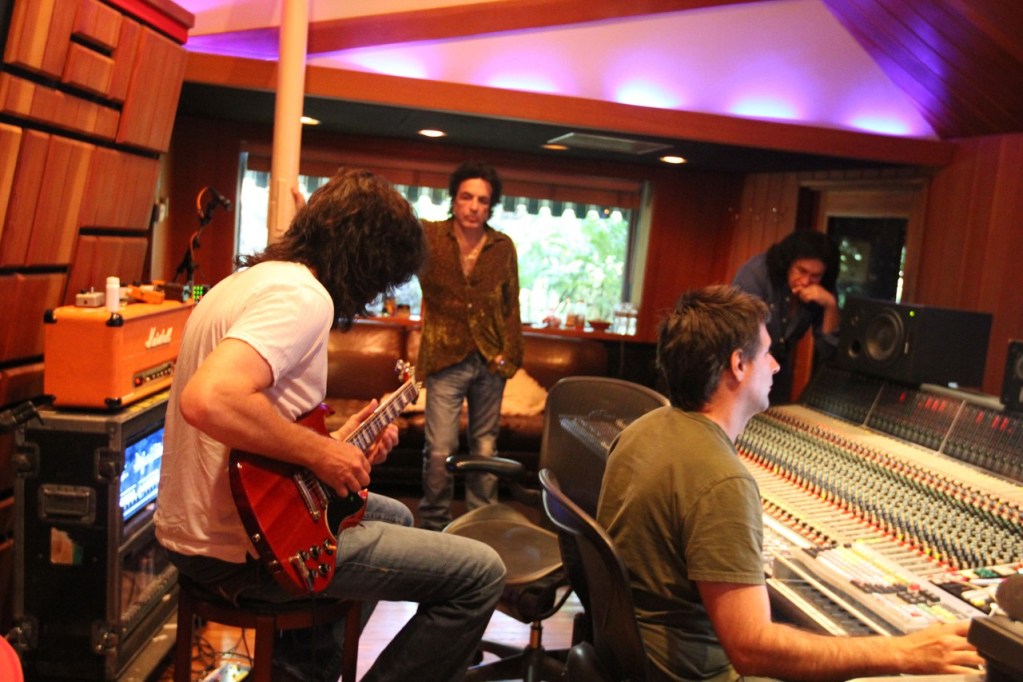
Andrew:
One album I didn’t mention was Psycho Circus. At the time, it was sort of advertised as a reunion album of sorts, but as time has worn on, it’s been revealed that you played most of the lead work on that record, which for me doesn’t diminish a thing. It’s a great record. Tell us about your experience regarding Psycho Circus. At the end of the day, why did you end up playing on that record as opposed to Ace?
Tommy:
At the time (early 1998), I had been working behind the scenes for KISS. I remember there were a lot of unknowns; the Reunion Tour had just finished, and I was hearing the band wanted to record a reunion album, but Ace and Peter for whatever reason weren’t going to show up to do the record. Gene called me one day and asked me to come down and record guitars, which I was happy to do. It needed to be on the down-low, so I agreed to a buyout and they wrote me a check. [Laughs]. They had to keep the ball rolling and this was the only way to do it. Bruce Fairbairn had been hired to produce, so Paul, Gene, and Bruce did preproduction and arranged tunes for a few weeks. I was looking forward to working with Bruce again because he’d produced Black ‘N Blue’s Without Love record years before. In early January ‘98, we set up at One on One Studios in North Hollywood and recorded almost all the tracks there. (Drummer) Kevin Valentine and I did all the basic tracks except, “Into the Void.” If it was a Paul tune, he’d play guitar on the basic, too. I don’t remember Gene playing much bass guitar, maybe a couple of tunes. Bruce (Kulick) came in and played bass on most of the tunes. I recorded most of the guitar solos and played bass on, “We Are One.” Eventually, they came to some sort of terms with Ace and Peter, so they came in and cut one track and did some vocals and a couple of guitar solos. At that point, most of the overdubs and lead vocals were done at A&M Studios in Hollywood. I thought the record sounded good and most of the tunes were great, particularly “Psycho Circus,” “I Pledge Allegiance…” and “We Are One.” One song I never got was, “You Wanted the Best.”
Andrew:
The band’s next two records were Sonic Boom and Monster, which as time has worn on, have really aged so well and are settling in as KISS classics in their own right. More than a few years removed now, what are your thoughts on those records? In your opinion, what’s their place within the KISS canon?
Tommy:
It had been 11 years between Psycho Circus and Sonic Boom. I think Paul wanted to get it right and make a cohesive record once and for all. Records like Hot in the Shade, Carnival of Souls, and Psycho Circus were all over the place stylistically. The cool thing about Sonic Boom and Monster was that we recorded them as a band in the room together. Gene played bass on every tune; Paul played guitar on every tune etc. For Sonic Boom, I started going to Paul’s house every few days and we’d sit down, and he’d play riffs. I’d help him arrange his riffs or I’d add a few of my own ideas. None of the tunes started with an idea of mine. It was cool to see Paul do his thing and watch his process. Gene wrote most of his tunes on his own. I remember he, Paul, and I sitting down writing together too (“I’m an Animal” and “Russian Roulette”), which was unusual because evidently, they hadn’t done it that way in a long time. “I’m an Animal” started out as a tune called “Balls” (I’ve got balls…). The idea with SB was to get back to making a classic-sounding KISS record. In retrospect, I think some of it sounds too derivative, but again, that’s what we were trying to do. I wrote, “When Lightning Strikes,” with that mindset, too. In the end, SB was sonically great; I thought Greg Collins did a nice job on the mix. With Monster, we wanted to take the classic KISS record idea to the next step. We basically wrote the same way, getting together at Paul’s house or someone’s hotel room on the road. I think the tunes on Monster are better than SB and I got more comfortable being more me on the guitar solos. I thought I played really well on Monster. The downfall was the mix. I was surprised because the tracks themselves were recorded better than SB, but unfortunately, the mixes were muddy and not dynamic. The only mix I liked was, “Outta This World.” Maybe I’m biased. [Laughs].
Andrew:
I’d like to go all the way back to the 80s now and talk about Black N’ Blue. What a great and underrated band. How did the band come together?
Tommy:
Jaime (St James) and I met when were just out of high school in 1978. From the start, we had a kindred spirit for wanting to play loud Hard Rock. We formed a group that played the Portland clubs for a couple of years that was good but didn’t have a cohesive musical direction or image. Finally, in late 1981, we said, “Fuck it, let’s start a new band,” and make it exactly how we want it. Black N’ Blue was born. The New Wave of British Heavy Metal inspired us along with the 70s Rock bands we grew up loving. There was also a scene brewing in LA and we knew we’d fit in there. It got to the point where the Portland club owners said they wouldn’t book us unless we played four hours of Rock radio covers each night. All we wanted to do was play our own original songs like, “Chain Around Heaven,” “I’m the King” and “Violent Kid.” Finally, they said you can’t play here because your drummer’s too loud; we said, “We’re out of here. Hollywood, here we come.”
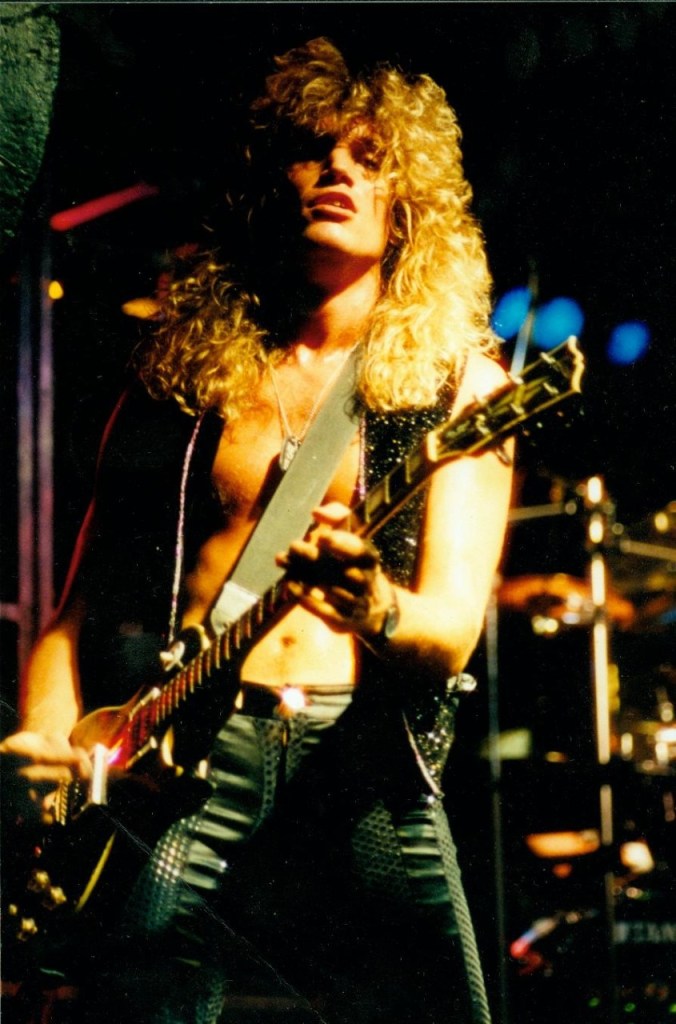
Andrew:
Black N’ Blue is interesting, because you guys sort of came out of the gate hot with your self-titled record, and it faded a bit from there. Why do you feel that Black ‘N Blue never fully took off? What is luck? Or a product of the musical landscape shifting?
Tommy:
We always had the ability to write really good songs, but that might have been our curse. When the record label kept pushing us to lighten our image and do music to get on the radio, we didn’t have the balls to say, “Fuck you.” We just started writing really good poppier rock tunes, especially on our second record, Without Love. When Gene got involved on our third record, we tried to toughen it up again. I think the long and short of it is, after a while, kids weren’t exactly sure what we were.
Andrew:
I mentioned your debut, but I would be remiss if I didn’t mention Without Love, Nasty Nasty and In Heat. These are great Hard Rock records. What do you recall about the recording sessions?
Tommy:
Lots of great memories and experiences I could go on for days about. Recording Without Love in Vancouver, BC was wonderful because of all the extracurricular activities Vancouver provided. [Laughs]. Strip clubs with showers, tons of blow. The actual recording was phenomenal because we hired Bruce Fairbairn as producer, but we quickly realized the magic was coming from the guy who was engineering the record; his name was Bob Rock.
Andrew:
Once things wrap up with KISS, is there any chance we see a Black N’ Blue reunion or even some new music? If not with Black ‘N Blue, how about a solo record or other new projects?
Tommy:
My buddy Jason Scheff (Chicago) and I have got together over the last couple of years to write, for no other reason than to enjoy the creative process. Fewer artists are releasing records anymore, so it just felt good to write some songs. Jason is multi-talented. I ended up writing eight things with him on his grand piano and me on acoustic guitar. We sent the ideas to lyricist Randy Goodrum who finished them. We had no expectations other than to enjoy the process. We went to Scott Frankfurt’s studio in Woodland Hills and cut basic tracks with Steve Ferrone (Tom Petty and the Heartbreakers) on drums. Jason and I decided we didn’t want to record with a click track and record naturally as they did in the old days. [Laughs]. Jason sang the tunes in one or two takes, done. The tracks were so good we asked Bill Champlin (Chicago) to come in and play Hammond B-3 and sing backup vocals with Jason and talk about a sound. We went over to Luis Conte’s studio and he added some amazing percussion; cool guy too. Todd Rundgren mixed one so far, and it’s killer. This has been a labor of love and we’re not finished yet. At some point, these songs will see the light of day.
Andrew:
On the subject of new music, is KISS looking at any new music?
Tommy:
I haven’t heard anything.
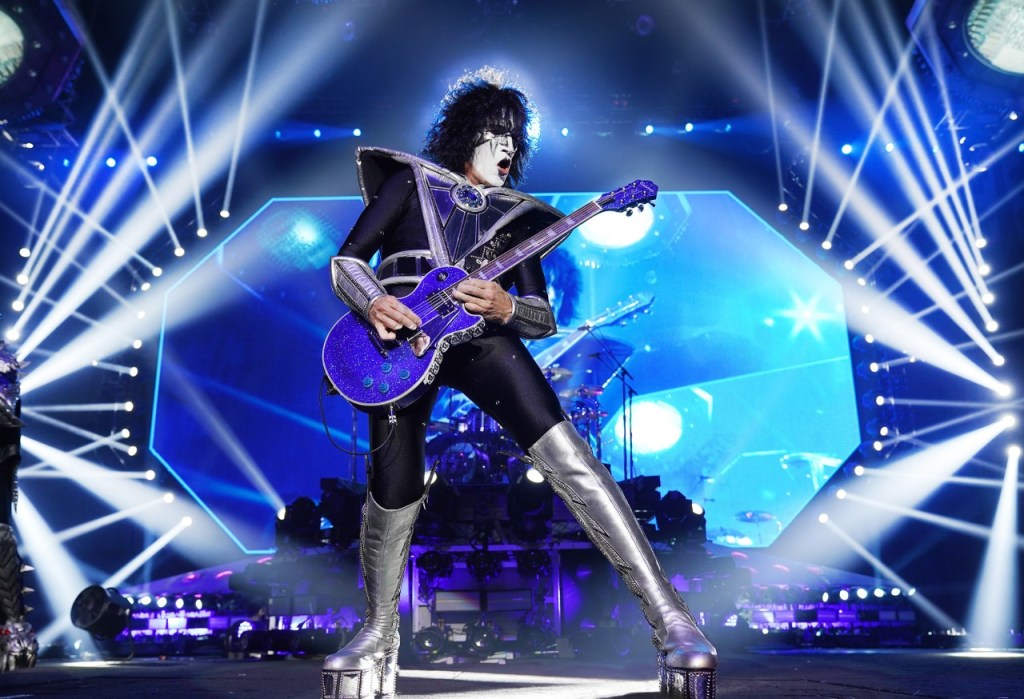
Andrew:
You’ve got a gorgeous signature line of guitars with Epiphone, right? Tell us more about that relationship and your current line. Aside from your Epiphone Les Paul’s, what other gear are you using these days? How has it changed over the years?
Tommy:
Epiphone’s done a nice job with my four signature guitars over the past ten years. I miss Jim Rosenberg (President of Epiphone Guitar) whom I had a great working relationship with until he retired two years ago. Gibson Guitar (Epiphone’s parent company) has been supportive through the years. I play Gibson Les Pauls, Explorers, and Flying Vs. Hughes and Kettner have supported and provided me with amplifiers for at least 12 years. I still use the tried-and-true Duotone 100-watt amps live. They’re really loud arena amps with a nice warm tone. They’re workhorses; I have at least eight on the road with me.
Andrew:
Are you into records? Tapes? CDs? Digital? Where do you like to shop for music?
Tommy:
Like most people, I don’t buy music much now; it’s the era of streaming. I guess that’s where technology has taken us. It’s a shame because growing up, we bought and collected albums, later cassettes, and then CDs. I miss buying albums and pouring over the liner notes, lyrics, and photos in album packages that were truly an art, a lost art. In those days, there was more mystique around the bands and artists; that’s all changed obviously in our hyper-digital world.
Andrew:
Last question. You’ve been in the business for well over 35 years. You’ve been/are a member of some of the best Hard Rock bands out there. You’ve toured the world and played to some of the biggest crowds ever. As a true veteran of the “scene,” what advice would you have for young artists looking to take the plunge?
Tommy:
When I was a kid about 11 or 12 years old– there was a store called Fifth Avenue Records at the Beaverton Mall (Oregon) where I grew up. On the wall, they had the top-40 singles in order from 1-40 and you’d go in there and look at the covers and pick the singles you wanted to buy, for 99 cents each. I loved the music and the artists that created and performed it. On the wall at the record store, I picked singles by Credence Clearwater Revival, Don McLean, and James Taylor. I literally dreamed of making music and emulating these artists. I tell kids, “Don’t be afraid to take a leap yourself and try your own hand at writing your future. Have the courage to pursue your dreams. You need the ambition to work hard, be on time, and never give up.” I’ve been asked a million times, “What’s the key to success?” More than anything, it’s perseverance. You can’t let the setbacks, doubt, and the uncertainty of everyday life stop you from moving forward.
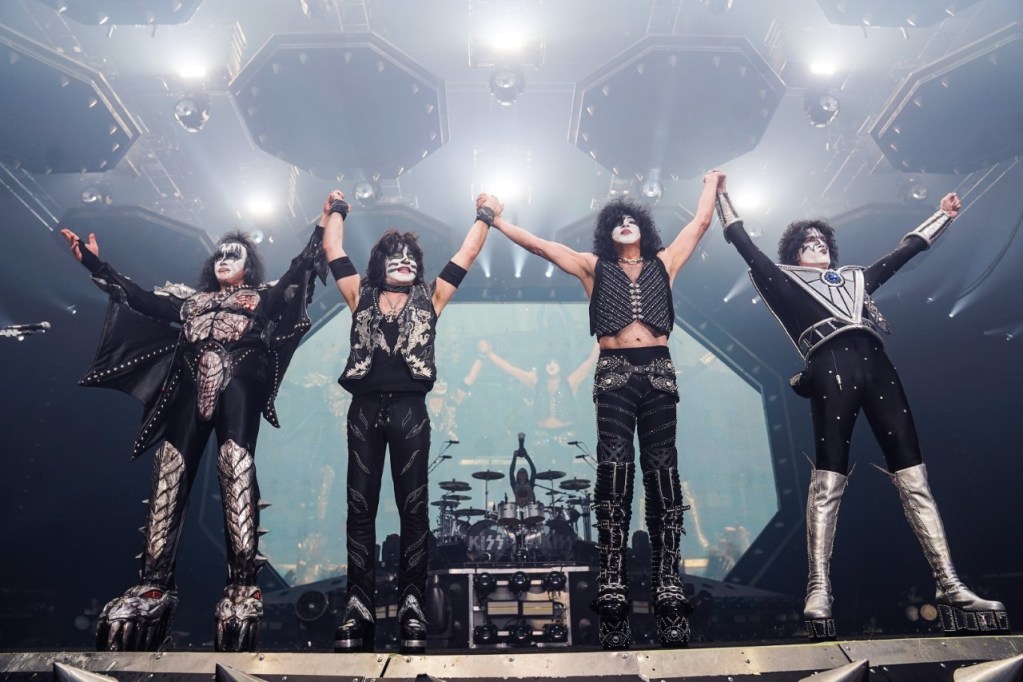
Interested in diving deeper into the work of Tommy Thayer? Check out the link below:
Be sure to check out the full archives of VWMusic Interviews, by Andrew Daly, here: www.vwmusicrocks.com/interview

thanks man. Tommy the fireworks out of the guitar was total Kiss. the fukkin jamm was awesome. we went to Sunset together and if i remember right that first sock hop you played was a bit controversial. thanks for keeping the music we grew up with alive. you’re doing great things and are truly an inspiration. can’t wait to see. haha. hear what you come up with next.
Tommy is absolutely awesome and he brings so much to KISS. Glad you enjoyed the interview. Thanks for popping by and stay safe!